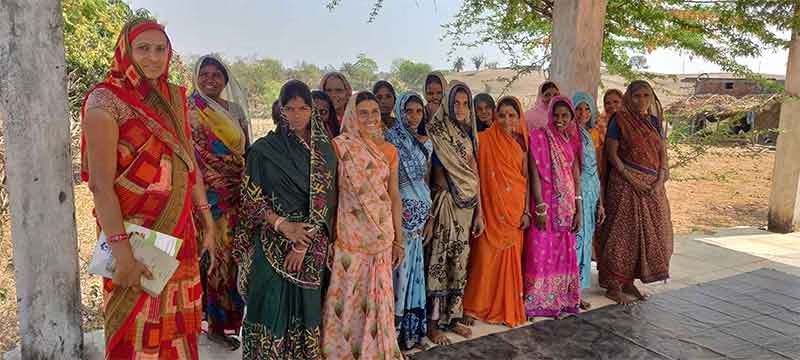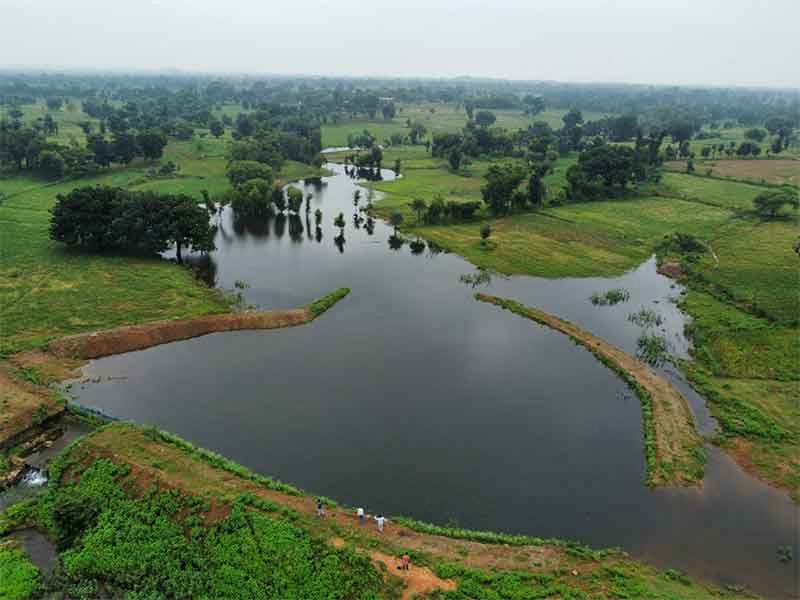
In recent years efforts of Vaagdhara voluntary organization in Central India have been attracting increasing attention in view of the wider appeal of its work related to strengthening the self-reliance of rural communities, particularly tribal communities. This self-reliance approach can provide increasing confidence and resilience to rural communities by making it possible to meet more of their needs in healthy ways on the basis of sustainable livelihoods without incurring high expenses and debts, and at the same time the self-reliant system which minimizes waste, pollutants and fossil-fuels is also protective for environment.
This is linked closely to the concept of gram swaraj or village self-reliance which was very important for Mahatma Gandhi’s struggles against colonial rule. This concept was also aligned to finding alternative development pathways.
Several disciples of Mahatma Gandhi kept alive this concept in the post-independence period in some important although limited ways. However, in times of globalization it became difficult to keep alive the true spirit of this concept. One saving grace was that even in these times this concept of self-reliant rural communities remained close to the thinking of several tribal communities in particular.
Vaagdhara works with many such communities in the tri-junction zone of three states (Rajasthan, Madhya Pradesh and Gujarat) and strengthening self-reliance of communities has been an important base around which it has planned and implemented a number of creative initiatives relating to farming, water, afforestation, education, childhood, health, nutrition and other related issues. This work has attracted national attention and earlier this year Vaagdhara was in the forefront of organizing a national dialogue on gram swaraj and swaraj sandesh (message of swaraj).
At a time of worsening many-sided environmental crisis, concerned people worldwide are looking beyond quick-fix solutions to find alternative ways of thinking, and actual living based on this thinking, which prevail among several communities and trying to learn from this to find at least a part of the answer, a more durable and sustained answer, for avoiding the worst of the environment crisis.
It is as a part of this wider quest and search that the work with tribal communities in India and elsewhere which is based on a better understanding of community strengths has a wider and important appeal and relevance.
Some groups and persons approach this work with a patronizing attitude. These efforts are unlikely to go very poor. It makes much more sense to approach this task with some humility and a sincere desire to learn from communities. This sincere learning can then be followed by help to strengthen communities. It is important to emphasize that such help is also important.
These communities suffered erosion and even disruption of their integrated, inter-related systems under the onslaught of colonial rule and its collaborators for a long time. Then there were other outsider exploiters who tormented them. So weakened, several communities were less able to cope with droughts and other increasingly adverse weather conditions. This turned several of them into migrant workers for survival. This further eroded their bonds with community and inheritance of it traditions and learnings.
So while basic community existence remains in place in most villages, it would be unreasonable to expect that several community strengths have not been weakened. This is why a process based on first understanding communities and then helping to strengthen them is desirable.
Vaagdhara’s members approach communities with this spirit of learning and understanding. This spirit has enabled them to understand the many virtues of the ways in which community land use and farming practices are planned, keeping in view local conditions, strengths as well as constraints. Based on this understanding they are better able to appreciate what kind of helpful activity should be taken up and what kind of interference should be avoided.
It is with this kind of understanding that several households who had become dependent on migrant work in distant cities were approached by Vaagdhara members to explore whether they were keen to return to their neglected farmland and if yes, what kind of help they’ll require during the transition period. Amritlal wanted seeds, saplings and some guidance, and some hand holding to withstand any temporary crisis due to his denial of wages as a migrant worker. Once the first year of transition was completed, there was no going back. Amrit Lal now grows a diversity of grains, vegetables, fruits, spices and other crops, following natural farming methods. His farm and its boundary have plenty of trees and he has received an award for motivating villagers to grow thousands of trees. He has come a long way back from struggling in many places as a migrant worker to returning to his family farm in Bhundri village of Banswara district. His wife Surta is very happy with the family living together again and working together in very creative ways.
After meeting this family I went to meet a women’s group, called Saksham Samooh, in Nagli Sera village of the same district. Almost all these women had stories to relate about their ability to improve their economic condition based on increasing cooperation and self-reliance approach, growing a diversity of mixed crops with emphasis on their food needs. Susheela said, with the exception of salt and edible oil, I am able to produce all the food I need in my farm.
The ability of small farmers to meet most of their food needs on small farms, without using chemical fertilizers and pesticides for the most part, is enhanced by ability of people to meet their many other needs from forests and wildly growing trees, bushes and plants.
Saving traditional seeds of great diversity must be an important part of this self-reliance. Apart from this being encouraged at village-level, Vaagdhara has recently organized seeds protection festivals where people gathered at about 90 places for meetings to share information about diverse kinds of seeds and also brought seeds with them to share and exchange with others. Similarly food festivals are also organized to share information about traditional nutritious foods which have been getting rare. In addition recipes are shared and delicious dishes are also cooked and shared here, much to the delight of children.
Educational efforts of Vaagdhara emphasize that children should not be alienated from their communities as they grow up, and it is hope that as they acquire more learning they can come back to their communities to help as teachers or doctors in other ways.
While villages have swaraj groups and saksham groups, at a wider level there is a forum for tribal community development initiatives (janjati vikas manch) which takes up wider mobilization tasks.
Working with this spirit of understanding traditional strengths of communities and then trying to revive and improve them in difficult times can be a valuable contribution not just at the local level, but also fulfils the wider need of keeping alive thinking and living and livelihood patterns that are much more in tune with protection of environment and sustainable livelihoods.
Subscribe to Our Newsletter
Get the latest CounterCurrents updates delivered straight to your inbox.
Bharat Dogra is Honorary Convener, Campaign to Save Earth Now. His recent books include Planet in Peril, Saving Earth for Children and Man over Machine—A Path to Peace.













































